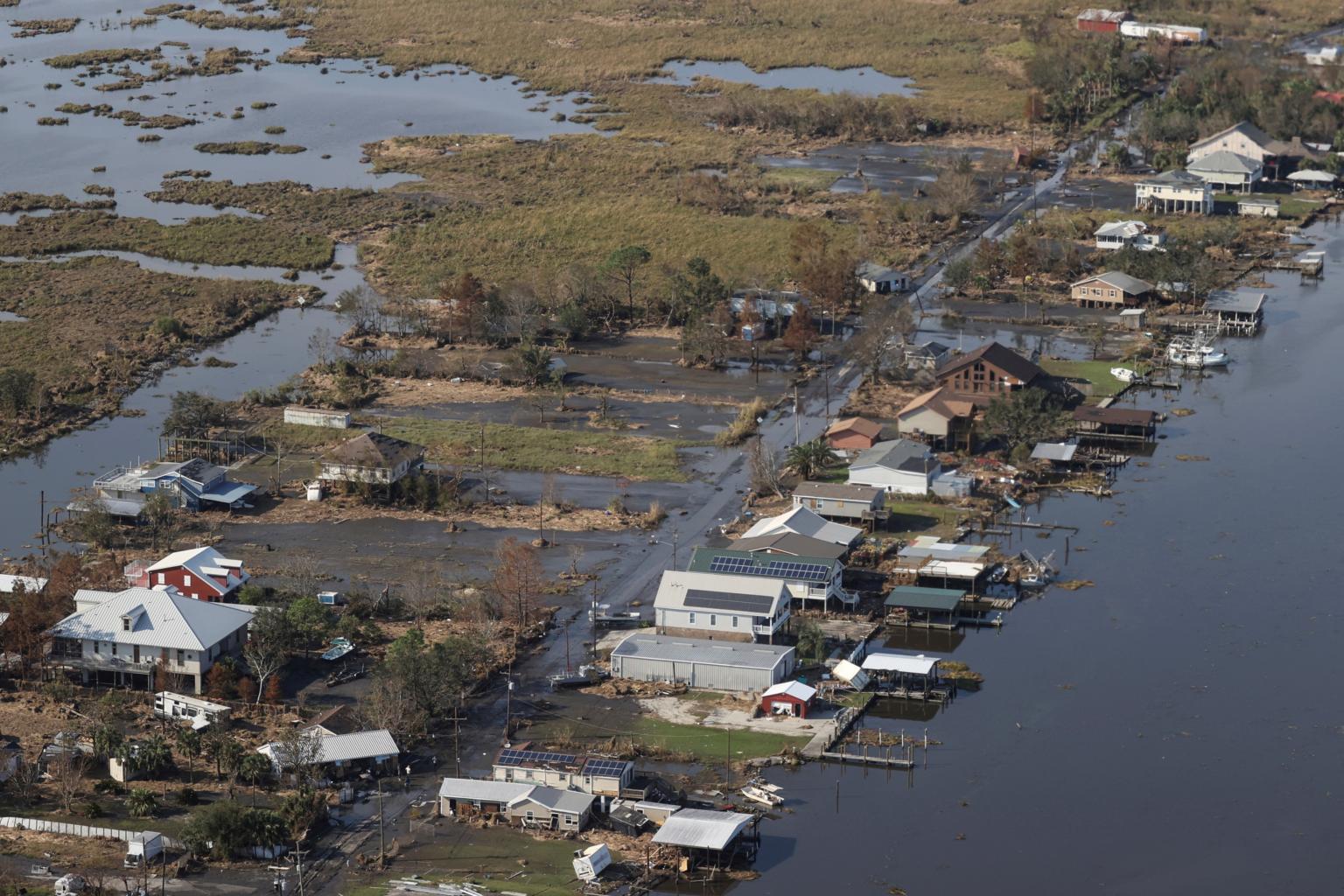Road to COP26 climate summit paved with uncertainty
Sign up now: Get ST's newsletters delivered to your inbox

This photo taken on Sept 3, 2021 shows buildings damaged by Hurricane Ida in Louisiana, US.
PHOTO: REUTERS
PARIS (AFP) - One month from the COP26 climate summit, world leaders are under unprecedented pressure to decarbonise their economies and chart humanity's path away from catastrophic global warming.
But in the midst of a pandemic still raging in parts of the globe, and with countries already battered by climate-driven calamities pleading for help - and money - the negotiations in Glasgow are likely to be fraught.
The summit, already delayed a year by Covid-19, comes as the gap between what science says is needed to avert disaster and what governments are doing is larger than ever.
Addressing around 50 ministers last Thursday (Sept 30) at the start of a pre-COP gathering in Milan, United Nations Secretary-General Antonio Guterres laid out the choice facing delegates in Glasgow.
"We can either save our world or condemn humanity to a hellish future," he said.
COP26 host Britain says the summit's main aim is to keep in play the 1.5 deg C temperature goal enshrined in the 2015 Paris Agreement.
In August, the UN's Intergovernmental Panel on Climate Change dropped a bombshell report warning that the 1.5 deg C threshold - by far the most ambitious target of the Paris deal - would be reached as soon as 2030.
By 2050, earth will be 1.5 deg C hotter than in pre-industrial times, no matter what is done about planet-warming carbon emissions in the meantime, it said.
With a little over 1 deg C of warming so far, the two years since the last UN climate summit have seen record-shattering wildfires in Australia and the United States, tarmac-melting heatwaves in North America and Siberia, and massive flooding in South-East Asia, Africa and northern Europe.
'Trust deficit'
The Paris deal requires nations to renew their plans to cut domestic emissions - known as national determined contributions, or NDCs - every five years.
Far from limiting warming to 1.5 deg C, the UN says countries' latest submissions over the past year have put earth on course to heat up by a "catastrophic" 2.7 deg C this century.
British Prime Minister Boris Johnson summed up his hopes for Glasgow as "coal, cars, cash and trees", meaning deals for global phase-outs of coal power and internal combustion engines, funding for climate-vulnerable nations, and mass tree planting.
But the actual to-do list for delegates at COP26 is not quite so concise.
For starters, six years after the Paris Agreement was struck, countries still have not finalised the deal's "rule book" that specifies how its goals are reached and progress measured.
Long-festering disputes include those over how carbon markets are governed, and a common timeframe for an interim "stock take" to see how each country's action stacks up.
Poorer nations, meanwhile, are demanding that richer ones finally make good during COP26 on a decade-old promise to provide US$100 billion (S$135.8 billion) each year to help them decarbonise their grids and adapt to climate change.
Ms Tasneem Essop, head of the Climate Action Network representing some 1,500 environmental groups, said that Glasgow was taking place after a harrowing few years for vulnerable populations.
"This COP is happening, unlike other COPs, at a time where all these burdens and suffering are sharply felt by the developing countries and in this context, we have... rich nations that were unwilling to stand in solidarity with poor nations to supply the vaccine," she told AFP.

Ms Essop said there was a huge "trust deficit" between nations already battling climate change and the historic emitters that helped to cause it.
The spectre of Covid-19 vaccine inequity is likely to loom large in Glasgow, with many representatives of poorer nations unable to afford a trip that would include expensive hotel quarantines.
Mr Sonam Wangi, chair of the Least Developed Countries negotiating bloc, said as much this week, tweeting that he was "still concerned about the possibility of getting our delegates to #COP26".
China, G-20 key
COP26 president Alok Sharma this week sought to allay such fears by saying there had been a "very healthy registration" in participants and that more than 100 world leaders had already confirmed they would attend.
Observers say there are some positive signs, with the US announcing a doubling of overseas climate aid and China saying it will cease new coal production abroad, both in recent weeks.
But for Mr Alden Meyer, a veteran of UN climate talks and a senior analyst at the EG3 think-tank, in terms of emissions cuts, "everyone is waiting to see what China will do".
President Xi Jinping announced last year his country's aim for carbon neutrality by 2060 and for domestic emissions to peak "around 2030".
The nation responsible for more than a quarter of man-made emissions has yet to submit a renewed NDC, although one is expected before Glasgow.
A Group of 20 (G-20) summit in Rome days before COP26, during which Italian Prime Minister Mario Draghi said he would push for members to commit to 1.5 deg C, could also prove influential.
"The hopeful scenario would be that the G-20 adds some momentum going into Glasgow," said Mr Meyer.
"The less hopeful scenario would be gridlock and stalemate in Rome, and then go from there to the world leaders' summit in Glasgow without real unity."


